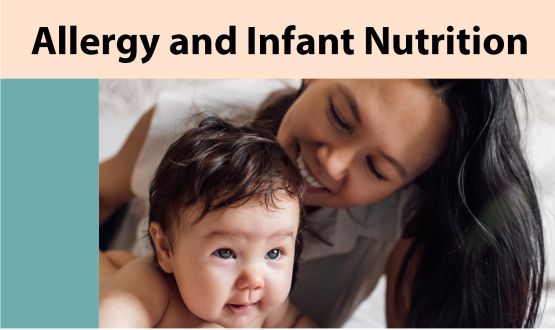
Dr Werther discusses how allergies may present in breastfed babies, whether allergies can be prevented with maternal interventions and how to consider the diagnosis of allergies in these babies. She goes through management issues, including considering the role of modifying the maternal diet where necessary.
0.75 L Cerp (I, III, V, VII)
I Development and Nutrition
III Pathology
V Psychology, Sociology & Anthropology
VII Clinical Skills
After this presentation, the participant will be able to:
The first 1,000 days of life present a critical window for shaping the infant’s immune system and long-term health outcomes. This presentation explores the powerful role of infant feeding practices—particularly breastfeeding—in the development of the infant gut microbiome and the prevention of allergic diseases. Leila will examine how mode of birth, early nutrition, antibiotic and medication exposure, and maternal health influence microbial colonization. The presentation will highlight how breastfeeding supports microbial diversity, promotes immune tolerance, and reduces the risk of eczema, asthma, and food allergies. Leila will also review the emerging evidence on the timing of introduction of solid foods, the role of pre- and probiotics, and practical strategies to support optimal feeding practices in both low- and high-risk infants. Participants will come away with an integrated understanding of how informed feeding choices in infancy can reduce allergy risk and support robust immune development—tools that are essential in guiding parents and shaping public health strategies.
1 L Cerp (I, II, III, V, VII)
I Development and Nutrition
II Physiology & Endocrinology
III Pathology
V Psychology, Sociology & Anthropology
VII Clinical Skills
Occult blood in the stool of an exclusively breastfed infant can indicate a cow-milk/soy protein allergic colitis. In some instances, pediatricians may recommend moving the symptomatic infant to infant formula to help provide a resolution. Research shows, though, that elimination of the appropriate allergens from the maternal diet can improve or resolve infant symptoms. As not all infant allergic colitis is due to a cow-milk/soy protein intolerance, this presentation will overview clinical differences between food protein-induced allergic proctocolitis (FPIAP), food protein induced enterocolitis syndrome (FPIES) and gastroesophageal reflux disease (GERD), as well as the difference between IgE and Non-IgE mediated allergic responses in breastfed infants. Then, the basics of an elimination diet and criteria warranting introduction of an elimination diet will be summarized.
1 L Cerp (I, III, V, VII)
I Development and Nutrition
III Pathology
V Psychology, Sociology & Anthropology
VII Clinical Skills
Though the overall risk of the development of food allergies in infants remains very low, prevalence has been increasing. And with that increase, we are also seeing more concerns for food allergies in the exclusively breast/chest fed infant. This presentation aims to educate on the different types of food allergies (IgE mediated vs non- IgEmediated) and their symptoms commonly seen in a breast/chest fed infant. We’ll review the current feeding recommendations for an infant that presents with food allergies including maternal elimination diets. This presentation will also explore the role of the lactation consultant in managing food allergies and supporting our families that face this challenging situation.
1 L Cerp (I, III, V, VII)
I Development and Nutrition
III Pathology
V Psychology, Sociology & Anthropology
VII Clinical Skills
In this presentation, Dr. Trill presents a practical, science-backed framework for introducing new foods when infants show signs of food reactivity. Participants will learn two parallel trialling pathways, indirect trials through breastmilk and direct trials to baby, and how to choose the right approach for each family. Trill will define confirmation trials, in which foods are reintroduced that were removed when a trigger was suspected but not yet proven, and reintroduction trials, which test foods already confirmed as triggers after a period of elimination. Participants will come away with clear protocols for timing and dosing, guidance on monitoring infant responses, and strategies for interpreting results to inform ongoing feeding plans. By the end of this presentation participants will have a step-by-step plan to trial new foods with confidence, reduce guesswork, and support families in moving forward safely and successfully.
0.75 L Cerp (I, III, V, VII)
I Development and Nutrition
III Pathology
V Psychology, Sociology & Anthropology
VII Clinical Skills
There is a lot of focus on the medical need of the allergy baby and how to support that but what about the parents? This presentation is designed to take a look into how parents feel when they live with an allergy baby and how this impacts their lives. Using stories from families as well as looking at the research available, this presentation is designed to help you understand the true impact onto allergy parents as well as how we support them and their families in our roles.
0.75 L Cerp (I, III, V, VII)
I Development and Nutrition
III Pathology
V Psychology, Sociology & Anthropology
VII Clinical Skills
What are allergies and what impact do they have on babies/children and the breastfeeding dyad? This talk explores allergies and breastfeeding by defining them, look at their effects, discussing how to support breastfeeding/formula-feeding/combination-feeding, and then uses all this information to analyse case studies. These are all real case studies, which explore how breastfeeding parents handled their baby or child’s allergies and the impact of the allergies on their feeding relationship. We will discuss the case studies and consider what we as IBCLCs might have done to support this dyad or family.
1 L Cerp (I, III, V, VII)
I Development and Nutrition
III Pathology
V Psychology, Sociology & Anthropology
VII Clinical Skills
An elimination diet during breast milk feeding is often used to address suspected food allergies in the infant. This dietary adjustment could affect the mother and the infant, making careful nutritional planning essential. For the mother, eliminating major food groups can lead to deficiencies in key nutrients which may also impact the quality of her breastmilk and therefor the growth and development of the infant. Healthcare professionals should be aware of the possible implications of elimination diets and understand how safely navigate this process, including the need for referral to specialised services.
0.75 L Cerp (I, III, V, VII)
I Development and Nutrition
III Pathology
V Psychology, Sociology & Anthropology
VII Clinical Skills
There is a lot more knowledge and insight now around how to safely start solids for infants and how to recognise immediate type allergic reactions, termed IgE mediated allergies. However, it is still difficult for parents and even clinicians to recognise delayed allergic reactions such as food protein induced allergic enterocolitis (FPIES). This presentation aims to help people know when to consider these diagnoses and what to do about them, while waiting to see an allergy specialist.
1 L Cerp (I, III, V, VII)
I Development and Nutrition
III Pathology
V Psychology, Sociology & Anthropology
VII Clinical Skills
In this presentation, Dr Boyle describes ways in which the nutrition industry use allergy to further their marketing objectives. Unfortunately, these marketing activities can serve to undermine infant and young child feeding by countering public health nutrition advice. Financial relationships between the nutrition industry and the allergy healthcare professional community create blurred barriers between marketing messages and healthcare advice, meaning that allergy professionals and public health nutrition professionals often find themselves in conflict. Practitioners and scientists working with infants and young child nutrition need an awareness of these nutrition industry strategies in order to confidently support optimal nutrition in families where there is concern about allergy. While allergy is quite common in many populations, allergy is not a valid reason to deviate from global, regional or national public health guidance for feeding infants and young children.
0.75 L Cerp (I, III, V, VII)
I Development and Nutrition
III Pathology
V Psychology, Sociology & Anthropology
VII Clinical Skills
Food Protein-Induced Enterocolitis Syndrome (FPIES) is a non-IgE mediated food allergy affecting an estimated 900,000+ Americans, yet it remains widely underdiagnosed due to delayed symptom presentation and lack of confirmatory diagnostic testing. Breastfeeding families face unique challenges when their infant develops FPIES, as dietary proteins can transfer through breast milk and elicit reactions in sensitive infants. Lactation professionals are often the first point of contact for families experiencing unexplained infant symptoms such as profuse vomiting, bloody or mucusy stools, and failure to thrive. This session provides lactation professionals with the scientific foundation to identify potential FPIES presentations, understand the mechanisms of dietary protein transfer through breast milk, and support families through elimination diets while preserving the breastfeeding relationship. Content reflects the latest peer-reviewed research from 2024-2025, including newly identified FPIES phenotypes, food-specific resolution rates, and emerging biomarker discoveries. Participants will learn evidence-based approaches to food trialing, low-reactivity first foods for solid introduction, and strategies for supporting the significant psychosocial burden FPIES places on families. This session bridges molecular biology with clinical application, equipping lactation professionals to confidently guide families through FPIES identification, management, and resolution.
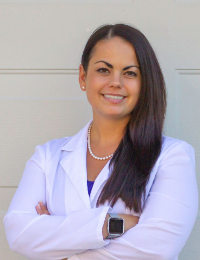
Trillitye Paullin
Dr Trill is a molecular biologist, inventor, and the founder of Free to Feed™, where she combines cutting-edge research with personal experience to empower families managing infant food allergies while breastfeeding. She leads multiple NSF- and Idaho Chamber-funded studies and holds the first U.S. patent for detecting dietary proteins in human milk. Her own journey began in 2015 when she navigated her daughter’s severe food allergies and realized there were no evidence-based tools to help. Out of that urgency, Free to Feed was born—now based in North Carolina’s Research Triangle Park—offering education, clinical support, and an at-home allergen detection system. Dr Trill also brings over 20 years of leadership from her service in the Army National Guard, including a deployment to Iraq and numerous domestic emergency missions. She speaks regularly on maternal-infant health, immunology, and food allergy innovation and serves as chief science officer for Nova Vita Laboratories and Restore Biologics.
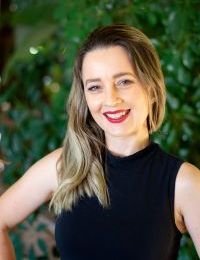
Tanya van Aswegen
Tanya van Aswegen is an Accredited Practising Dietitian with over 15 years of extensive experience in clinical and public health nutrition across diverse cultural landscapes, including Australia, the United Arab Emirates, South Africa, and the United Kingdom. Tanya has also worked on a policy and advocacy level with esteemed organisations such as UNICEF and the World Health Organisation to improve nutrition and health outcomes for women and children at a country level. She holds a BSc Degree in Nutrition and Dietetics and a Master of Public Health degree and is currently working in private practice focussing on optimising early life nutrition and specifically supporting breastfed infants with food intolerances and allergies in both a clinical and research capacity.

Chaitanya Bodapati
Dr Chaitanya Bodapati is a dual trained paediatric allergy/immunology specialist and general paediatrician who works in Sydney, Australia. Being a paediatrician, she has a holistic approach when managing her patients' issues. She herself, had a baby who had multiple food allergies, which has further helped her understand the impact it can have on a household from her own personal experience. Dr Chaitanya is particularly interested in managing food allergies. Chaitanya also has experience with a vast range of other allergic conditions including delayed cow’s milk allergy, hay fever, eczema, medication and insect allergies, uncommon causes of hives, food protein induced enterocolitis syndrome (FPIES), eosinophilic oesophagitis (EoE) and immune conditions.

Robert Boyle
Robert Boyle is a clinical paediatric allergist who has both a public and private practice and a research and teaching programme at Imperial College London, UK. His research programme aims to find ways to prevent allergic conditions from developing during early childhood. His has triggered changes to infant feeding guidelines worldwide and has supported legal actions against the nutrition industry for allegedly misleading claims in relation to allergy.

Hope Lima
Dr Hope Lima (she/her) is a nutrition and lactation educator and clinician who wants to help raise the bar for how we care for clients in the field of maternal and child health. She is also a wife, step-mother to three, dog lover, and nature enthusiast.
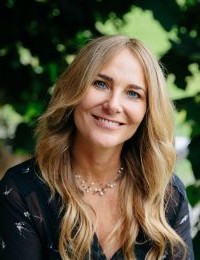
Leila Masson
Dr Leila Masson is a Sydney based consultant paediatrician and author of “Children’s Health A-Z” a parent’s guide to natural therapies for common childhood ailments. She specialises in nutritional and environmental medicine for children’s health issues, including allergies, asthma, behaviour problems, autism spectrum disorders and ADHD. She sees patients at her clinic in Tamarama and mentors doctors in integrative paediatrics. She received her medical doctorate from the Free University of Berlin and did her paediatric specialist training at the University of California in San Francisco. She received her Master in Public Health from Harvard University and her Diploma in Tropical Medicine from the London School of Hygiene and Tropical Medicine. She is a fellow of the Royal Australasian College of Physicians, and the Australasian College of Nutritional and Environmental Medicine. Leila has worked in the US, Europe, New Zealand, and volunteered for 2 years setting up a rural clinic in Pakistan. Dr Masson lectures internationally on the subject of children’s nutrition and an integrative medicine approach to paediatric issues, including autism spectrum disorders, ADHD, allergies, recurrent infections, and PANDAS/PANS. She speaks English, German, French, and Spanish.
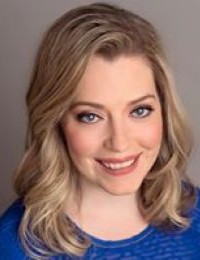
Meghan McMillin
Meghan McMillin holds a Master’s Degree in Human Nutrition from the University of Illinois at Chicago. She has been a registered dietitian nutritionist (RDN) since 2013 and became an IBCLC in 2019. Meghan spent several years working clinically in the NICU, pediatric floor and women’s units of a local hospital. In 2019, Meghan started her own private practice, The Lactation Dietitian, with a focus on infant and pediatric food allergies. She enjoys sharing her knowledge through social media and public speaking. She is the coauthor of the eBook What To Eat When Your Baby Can’t Tolerate Milk, Soy, or Egg Protein. Meghan has presented both nationally and internationally. In 2020, Meghan was awarded the Emerging Professional in Women's Health Award from the Women's Health Dietetic Practice Group of the Academy of Nutrition and Dietetics. She lives with her husband and two children outside of Chicago, IL.

Kaya Thorpe
Kaya has been in the world of breastfeeding support for 11 years after the birth of her first son in 2013. Gradually moving from a peer supporter to sitting IBCLC in 2021. In 2020 she co founded Lowestoft and Waveney Breastfeeding Support which is a now a charity offering breastfeeding cafes, IBCLC home visits and breast pump hire and has delivered almost 1000 home visits and IBCLC led support since 2021. She became interested in allergies when her daughter was born in 2019 and they quickly discovered she had allergies. After spending so much of her personal time realising how little support there was out there for babies with allergies, particularly those with multiple allergies, she spoke at the Association of Breastfeeding Mothers Conference in 2022 and coauthored ‘Feeding your Allergy Baby’ in 2024 with BJ Woodstein, she has been working in private practice under the Milk Hub to work with allergy babies in my IBCLC role since 2023.
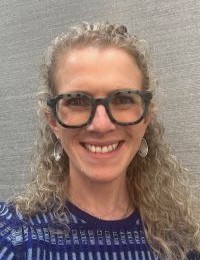
Rebecca Werther
Dr Rebecca Werther is a paediatric allergist and immunologist based in Melbourne. Rebecca did most of her training at the Royal Children’s Hospital in Melbourne, with completion of her allergy/immunology fellowship in Brisbane in 2011. Since then, she has worked in multiple private practices both in Brisbane and in Melbourne, before establishing her own practice, Stem Allergy and Paediatric Specialists, in Glen Iris in 2019. Rebecca has a strong interest in managing babies and children with food allergy, eczema and allergic rhinitis. She is also passionate about helping families with unsettled babies, while ensuring breastfeeding mothers are well informed and supported when it comes to making decisions about dietary changes or feeding issues
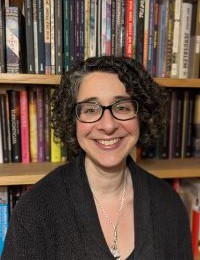
B.J. Woodstein
B.J. Woodstein is a translator, writer, doula, lactation consultant, consultant in EDI and education, and honorary professor of literature and translation. Her most recent books include Feeding Your Allergy Baby, The Road to IBCLC, Translation Theory for Literary Translators, and We’re Here! A Practical Guide to Becoming an LGBTQ+ Parent. She lives in Norwich, England, with her wife and their children.